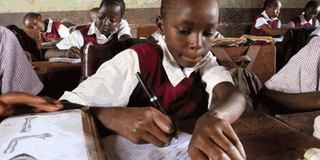To be great, we must invest in education

A Class Eight pupil at Gathukimundu Primary School in Mukurwe-ini writes notes during a lesson on May 3, 2016. A great teacher ignites the fire of passion in the hearts of the students (he/she teaches students why they do things (attitude). PHOTO | JOSEPH KANYI | NATION MEDIA GROUP
What you need to know:
- Before you think of a curriculum, you must first ask yourself the future the curriculum is aimed at producing for the nation and not the individual.
- South Korea, Japan and Canada put a lot emphasis on Intellectual Property (property arising from exercising our minds in thought- inventions, innovations, brands et cetera).
Kenya is in the process of changing the 8-4-4 system of education to a new one, 2-6-6-3.
This was the subject of Magesha Ngwiri’s article, ‘Few will mourn 8-4-4 death, but let us not make same mistakes,’ (Saturday Nation, December 10).
I belong to the 7-4-2-3 system but have interacted with 8-4-4 for the last 24 years when teaching at Jomo Kenyatta University of Agriculture and Technology.
The graduates of 8-4-4 arriving at our gates 24 years ago are no comparison with what we are getting now.
They were something close to what was produced by the 7-4-2-3 system.
They were hard working and easy to engage with.
As the system progressed, we started receiving lazy and hard to engage fellows.
Something went badly wrong on the implementation downstream. Of course nobody would want to admit that this was the case.
I have had visits to a few developed countries in the recent past purposely to find out why those countries are developed and we are not.
One of the things I picked was the seriousness attached to education matters.
Before you think of a curriculum, you must first ask yourself the future the curriculum is aimed at producing for the nation and not the individual.
In South Korea, for example, at a certain point they decided that they wanted to be auto and electronics goods producers in the future and they put in place a curriculum that was going to produce those competencies.
FIX THE MIND FIRST
Today, they are among the world’s leading producers of electronics.
It does not matter how many times we are going to change the curriculum but if we have no good reason like where we would like our country to be in a number of years to come, it will amount to nothing.
At the heart of the matter is what we would like to do with the knowledge acquired in the process of learning.
South Korea, Japan and Canada put a lot emphasis on Intellectual Property (property arising from exercising our minds in thought- inventions, innovations, brands et cetera).
This is what they are using to produce the cars, your phone, aircrafts and all pieces of clothes you are wearing right now.
At Jkuat, I am in charge of Intellectual Property Management and I have had my good share of frustrations as I try to explain to the professors and administrators on the importance of Intellectual Property for them and our country.
This is because it has never been our culture to know that the world is driven and developed from the mind.
We think that development is buying plots and putting up flats, building SGR and superhighways.
All this amounts to nothing if it is not matched with proper development of the mind.
Look at how we use Thika highway, it tells you this is a first world road used by a third world mindset that needs re-engineering through the right education.
TEACHER CATEGORIES
In South Korea, I met a professor who opened my mind on what was ailing us.
He taught me that there are four kinds of teachers, and if a nation gets it wrong on this one they can be forever poor; 1. A common teacher, 2. A good teacher, 3. An excellent teacher and a 4. great teacher.
A common teacher just chatters in class. A good teacher teaches well (he/she teaches students what to do (knowledge).
An excellent teacher guides the students to be independent (he/she teaches students how to do things by themselves (skills).
A great teacher ignites the fire of passion in the hearts of the students (he/she teaches students why they do things (attitude).
Is Kenya addressing the kind of teacher who will implement the 2-6-6-3 curriculum and that the teacher will be teacher type 4?
Mr Kariuki is a senior lecturer, Department of Mechanical Engineering, Jomo Kenyatta University of Agriculture and Technology




